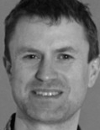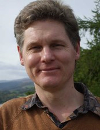Staff
Staff of the Russian Cross-Disciplinary group
Dr Richard Anderson

- Architectural History
- School of architecture and landscape architecture
- Edinburgh College of Art
Contact details
- Web: Personal webpage
Richard Anderson is a specialist in the history of modern and contemporary architecture in North America, Europe, and Eurasia, with emphasis on German- and Russian-speaking regions.
Dr Anderson is the author of Russia: Modern Architectures in History (Reaktion Books, 2015), a cultural history of Russian architecture from 1861 to the present. He is co-author, with Kristin Romberg, of Architecture in Print: Design and Debate in the Soviet Union (Columbia University, 2005).
His publications on Russian architecture include ‘Tatlin for Architects’ in Tatlin: New Art for a New World: International Symposium, ed. by Anna Szech (Ostfildern: Hatje Cantz, 2013); ‘The International Fronts of Soviet Architecture, 1919-1939’ in In Search of a Forgotten Architect: Stefan Sebök 1901-1942 (London: Architectural Association, 2012); ‘USA/USSR: Architecture and War’ in Grey Room 34 (2009); and ‘Taking Stock: Documenting Russia's Modern Heritage’ in Future Anterior 5, no. 1 (2008).
Professor Cheltsov works in the field of Algebraic Geometry. His research interests include Fano varieties and subgroups of Cremona groups. He obtained his BSc from Moscow State University in 1996. In 2000, he received a PhD at the Johns Hopkins University. Since 2004, he has been working at the University of Edinburgh. Professor Cheltsov’s Russia-related academic partnerships include Konstantin Shramov and Yuri Prokhorov from Steklov Mathematical Institute (Moscow). He also organized three research conferences in Russia, two in Moscow and one in Magadan. For more information on these conferences, please visit http://www.maths.ed.ac.uk/cheltsov/moscow/index.html, http://www.maths.ed.ac.uk/cheltsov/kulikov/index.html, and http://www.maths.ed.ac.uk/cheltsov/magadan/index.html.
Dr David Kaufman

Dr Kaufman’s research interests focus on East Central Europe and Russian Empire between the end of the 19th century and WWII, with a particular interest on issues of minority rights in Eastern Europe during the interwar period. His research on the background to the signing of the Polish Minorities Treaty at Versailles in 1919 is now continued via exploration of further aspects and outcomes of the peace-making process at the end of the First World War.
His recent Russia-related publications include ‘Restoring the “unbroken continuity of our history”: Commemoration of the Great War in the former Russian Empire’ in Comillas Journal of International Relations (2015).
Together with Dr Luke March (in SPS), Dr Kaufman organises two History & Politics Courses: Ideology and Politics in the Soviet and Post-Soviet Space and Society and Culture in the Soviet and Post-Soviet Space.
Dr Luke March

Dr March is a Senior Lecturer in Soviet and Post-Soviet Politics; Director (Taught) of the Graduate School of Social & Political Science; and Deputy Director of the Princess Dashkova Russia Centre.
He is a specialist on the former Soviet Union, with a particular interest in Russian and Moldovan politics, political parties in the FSU, democratisation and institution-building. His other research interests include the radical left in Europe, populism, and communism.
His main foci at the moment are research on the European Left Party (with Richard Dunphy), Russian nationalism and foreign policy, and Russian party politics.
Dr March’s selected research publications on Russia include: ‘State-society relations in contemporary Russia: New forms of political and social contention’ in East European Politics (2015), ‘The ‘Post-Soviet’ Russian Left – Escaping the Shadow of Stalinism?’ In Systemic and Non-Systemic Opposition in the Russian Federation. (2015), ‘Nationalism for Export? The Domestic and Foreign-Policy Implications of the New ‘Russian Idea’ in Europe-Asia Studies (2012), ‘The Russian Duma “Opposition”: No Drama out of Crisis?’ in East European Politics (2012), ‘Is Nationalism Rising in Russian Foreign Policy?: The Case of Georgia’ in Demokratizatsiya: The Journal of Post-Soviet Democratization (2011).
Nicola McCartney

Nicola McCartney is a professional playwright, director and dramaturge. She is currently Lecturer in Writing for Performance at the University of Edinburgh.
Her interests include development of social theatre projects in post-Soviet countries, and contemporary post-Soviet drama. Nicola McCartney has led a long running Impact project ‘Class Act: new plays and social theatre in the post-Soviet space’ funded by Impact award from the University of Edinburgh.
Elspeth Reid's main research interests are in comparative private law. She has published articles on Russian legal matters, and translated and edited numerous Russian texts.
Among her publications on Russia-related topics are Edinburgh Essays on Russia: Celebrating 50 years of Russian Studies (Astra Press, 2000); 'Evolutsiya shotlandskogo prava kak smeshannoi pravovoi sistemy' in Vestnik grazhdanskogo prava (2015); 'Defamation and Political Comment in Post-Soviet Russia' in Review of Central and East European Law (2013); 'Shotlandskoye pravo kak smeshannaya pravovaya sistema (Scots law as a mixed legal system)' in (eds.) Themis. Yearbook of the History of Law and Jurisprudence (R.I.Ts. Moscow, 2002).
Dr Steven Sutcliffe

Dr Sutcliffe specialises in alternative and popular forms of religion (such as ‘new age’ and ‘holistic’ spirituality), and in the modern history of the study of religion. He researches and teaches the history of the modern study of religion, including debates and disputes over the category ‘religion’.
Dr Sutcliffe’s expertise includes research on the Russian philosopher, mystic and spiritual teacher George Gurdjieff (1866-1949). His publications include ‘G.I. Gurdjieff and the Study of Religion/s’ and ‘Gurdjieff as a Bricoleur: Understanding the “Work” as a Bricolage’, both in International Journal for the Study of New Religions (2015), and ‘Hard Work: Locating Gurdjieff in the Study of Religion/s’ in Journal for the Academic Study of Religion (2014).
Dr Anna Vaninskaya

Dr Vaninskaya is a specialist in the British fin de siècle and Edwardian period literature. Her current research focuses on Anglo-Russian literary and cultural relations in the late nineteenth and early twentieth centuries, especially the writing of Russian foreign correspondents and revolutionary emigres in Britain, and British constructions of Russia.
She is the coordinator of the research project ‘Scotland and Russia: Cultural Encounters Since 1900′ (funded by the Royal Society of Edinburgh Arts and Humanities Network Award and the University of Edinburgh). Dr Vaninskaya is a member of the Anglo-Russian Research Network that brings together scholars and students from a variety of disciplines, as well as all those with an interest in cultural and intellectual relations between Britain and Russia in the period 1880-1950.
Dr Vaninskaya published on socialist propaganda, working and lower-middle class reading and writing, Englishness and patriotism, views of the past, romance, fantasy and children's literature, the history of reading and education, immigrant writing in Britain, as well as Anglo-Russian literary and cultural relations.
Her Russia-related publications include ‘“Truth About Russia”: Russia in Britain at the Fin de Siècle’ in The Edinburgh Companion to Fin de Siècle Literature, Culture and the Arts (forthcoming), ‘On Foreign Soil’ in Time Travellers: Victorian Perspectives on the Past (forthcoming), ‘Under Russian Eyes: Foreign Correspondents in Edwardian Britain’ in Times Literary Supplement (2014), and ‘Korney Chukovsky in Britain’ in Translation and Literature (2011).

